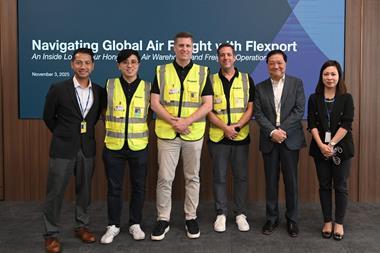Flexport has added more air cargo charter capacity in response to what it expects to be another robust year for airfreight.
The freight forwarder has announced a deal with JetOneX, which currently operates B747Fs, to provide services on the Asia to Europe trade lane.
The service will operate twice a week between Hong Kong and Maastricht (MST), and once a week between Ho Chi Minh City and Maastricht.
Neel Jones Shah, executive vice president airfreight at Flexport, said: “Disruption in the airfreight market caused by global uncertainty and rapidly changing Covid regulations continue to result in cancellations and volatile pricing for our customer.
“By partnering with JetOneX, we’re able to grow our capacity, and our customers will enjoy best-in-class service flying into an uncongested MST airport as a gateway for the rest of Europe. In the future, we plan to build upon this service to create a reliable network of scheduled services that our customers can rely on whenever they need it.”
Paul Rombeek, senior director of Network Trade Lane Management EMEA, added: “Additionally, faster transit times for airfreight are won with an excellent ground operation. Our network of owned and partner warehouses are designed to optimise the ground operation and seamlessly move freight from port to door. Once cargo arrives at MST, dedicated team members based in Europe will take over the rest of the shipment journey.”
The announcement comes shortly after the forwarder expanded its charter partnership with Atlas to add a third Boeing 747-400 freighter from September.
The long-term charter agreement will broaden Flexport’s network of dedicated freighters to include services from Asia to Los Angeles (LAX), Miami (MIA) and soon, Chicago (ORD).
Meanwhile, during a recent webinar, Shah predicted tough market conditions for at least the first six months of the year while belly capacity may not catch up with demand growth for years.
He said that the Omicron variant was keeping capacity tight, while dock worker unions in the US will this year start negotiations with port authorities over a new agreement - in the past this has resulted in port shutdowns.
Demand, meanwhile, is expected to remain brisk as consumers continue to spend and volumes transfer from troubled ocean shipping operations.
He said: "40% of passenger capacity is still grounded and some of it will never return. That is the long-term impact that Covid will have on travel patterns.
"This has the potential to reshape the demand capacity balance for the next ten years," he added.
"In the face of this capacity situation we have actually has one of the strongest market places we have ever had.
"Things could get worse when it comes to rates and transit times before they get better, although there is light at the end of the tunnel particular in the second half of 2022."
Shah concluded: "We think the demand patterns are quite strong. The economies in Europe and the US are doing quite well. We have inventory to sales ratios that are that the lowest they have been since this metric has been recorded.
"So we do believed that 2022 will be a robust year for airfreight partly driven by the demand patterns and partly by the ocean market that continues to be severely congested."















